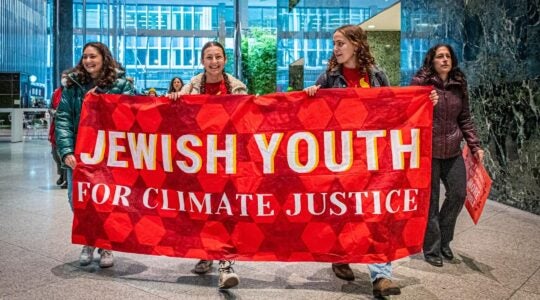RAMAT GAN, Israel (JTA) — In Israel, an estimated 15,000 individuals are involved in prostitution, including 5,000 under the age of 18, according to reports shared with the Task Force on Human Trafficking by Knesset member Orit Zuaretz of the Kadima Party, as well as other experts and activists. The reports say that the average age of entry is just 14 and that more than 90 percent of those involved in prostitution in Israel are subject to severe physical abuse, often by their clients.
Justifications abound for having prostitution be legal. Some claim that prostitution is a source of easy money or that its lengthy history points to its inevitable continuity. There’s even the dubious claim that it is a necessary conduit allowing men to fulfill their biological needs. Such myths clash dramatically with the truth and conceal a sordid underworld of violence, rape and the worst forms of abuse.
Merely utilizing terms such as "employment" and "profession" to describe prostitution lends credence to a system that preys on women who have faced severe physical and emotional oppression. More than 80 percent of women in prostitution have been sexually or physically abused in their youth, often by family members, according to reports shared with the task force. Entry is not a matter of choice but an unwitting endpoint in a cycle of abuse and despair.
Even with its recent decline — attributed to pressure from civil society organizations and the United States — Israel remains a destination country for human trafficking. The industry thrives on the vulnerable and exploits the troubled past of victims of abuse.
So why, especially if the negatives are even more disturbing than we had imagined, is this practice allowed to continue — with emphasis on the word "allowed"? For in the most basic sense, not enough has been done to combat an "industry" that thrives on the degradation and abuse of women and is supported by human traffickers. Allowed because though it is illegal to traffic human beings, run a brothel or work as a pimp, becoming a "consumer" of prostitution is still legal in Israel.
Essentially, though it is illegal to sell women, buying them is deemed acceptable. Though the world of prostitution is a hub for physical abuse, the transmission of fatal diseases and the restriction of freedom, it is still legal to fuel this horrid practice. The result should come as no surprise.
With no attempt to reduce demand, there is a constant incentive for criminal bodies to provide the supply. Targeting pimps and brothel owners is simply not enough, as evidenced by an average of more than 1 million brothel visits every month in Israel and a trade that accounts for more than $500 million each year, according to the reports.
Some argue that regulation and control of prostitution is needed, not prohibition. It’s a route that could provide for safer environments, less criminal involvement and an end to human trafficking. However, when such laws were enacted in Germany and Holland, conditions for women failed to improve and the laws were proven to be abject failures.
On Feb. 12, Zuaretz will bring a law to the Knesset that places criminal responsibility on those who purchase sexual services. What’s more, the legislation, which was proposed in 2010 to a ministerial hearing and is based on a Law that has been enacted in Sweden, Iceland, Norway and, most recently, France, would allow Israel to join the ranks of those nations working tirelessly toward a world free of modern slavery.
The result of this legislative action speaks of far more than simply whether we Israelis will choose to punish individuals who perpetuate these crimes. It will ask us to determine where we as a society stand in a debate centered on how we appropriate human rights. Do we feel that all individuals deserve liberty and justice, or have we set criteria that ultimately strip those less fortunate of the opportunities that freedom entails?
The challenge has been issued, but whether Israel decides to place itself on the right side of history has yet to be determined.
(Gili Varon, an attorney, is the director of the Task Force on Human Trafficking, a joint project with ATZUM that aims to engage the Israeli public and government agencies to confront and eradicate modern slavery in Israel.)
JTA has documented Jewish history in real-time for over a century. Keep our journalism strong by joining us in supporting independent, award-winning reporting.





